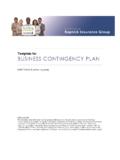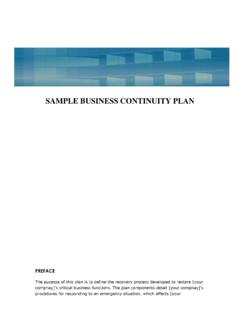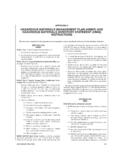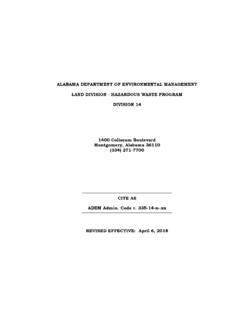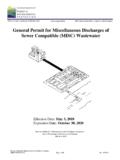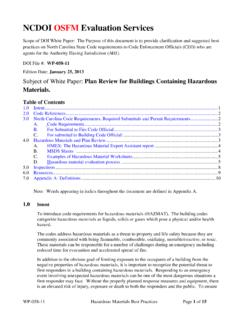Transcription of EMERGENCY ACTION PLAN Scope and Application
1 EMERGENCY ACTION plan 1 Scope and Application An effective Occupational Health and Safety Program provides many workplace benefits, some of which include increased productivity, high employee morale, and reduced absenteeism and illness. Despite the best prevention efforts, emergencies do occur. This program outlines procedures for best preparing for these emergencies such that the losses are minimized. Implementation management has the responsibility for the facility s EMERGENCY ACTION plan . To ensure the safety of our employees and protection of property, this plan will be reviewed, updated and revised as needed. Our primary focus will be on PREVENTION of emergencies. The program will be reviewed with each new employee, whenever the employee s responsibilities or designated actions under this plan have changed, and when this plan is updated, revised or changed in any way.
2 A sufficient number of employees will be trained to assist in the safe and orderly EMERGENCY evacuation of employees. This plan is kept in readily accessible locations throughout the facility for employees to review. Any questions regarding this plan should be directed Human Resources. This plan includes, but is not limited to, the following elements: EMERGENCY escape procedures and EMERGENCY escape assignments Procedures for employees responsible for critical facility operation prior to evacuation An accounting procedure for all employees after an evacuation Rescue and medical duties for authorized employees The preferred method of reporting all emergencies Names or position titles of persons designated with responsibilities and duties Procedure Alarm System A.
3 The alarm system for notifying employees to evacuate the facility consists of the _____ which can be detected over all facility operations and is distinctive enough to draw the attention of all employees. B. Special methods will be devised for those employees with vision or hearing impairment. C. Each employee will be trained in the preferred method of sounding the alarm. D. This system will be tested annually. EMERGENCY ACTION plan 2 Facility Evacuation A. Total and immediate evacuation of all employees will take place when the alarm sounds. 1. The evacuation will be deemed necessary by management when notified of an EMERGENCY event and its degree of hazard. B. Evacuations can be ordered for such emergencies as: 1.
4 Fire, other than a small incipient fire (such as a small trash can fire) 2. Explosion 3. Hazardous materials spill 4. Structural damage ( , roof collapse) 5. Terrorism and sabotage 6. Flood C. Depending upon the degree of hazard, employees will be instructed to either evacuate or remain in the facility. 1. As a general rule, employees will remain in the facility during these emergencies: a) Earthquake b) Storms c) Ice storms d) Snow e) Thunderstorms f) Tornadoes g) Hurricanes h) Wind storms D. EMERGENCY Escape Routes 1. EMERGENCY escape routes and maps are posted throughout the facility and all copies are included in this plan under Appendix B. E. Meeting Locations after Evacuating 1. Exact locations (Safe Assembly Areas) where employees are to meet after immediately leaving the facility are included in the Evacuation Maps under Appendix B.
5 2. The primary assembly point is _____, and the alternate when instructed by management is _____. Employee Training A. Employees will be trained as to when to initiate an alarm, who to notify, and how to initiate the alarm in the event of an EMERGENCY . 1. All employees will be trained to: a) Evacuate the facility in a safe and orderly fashion. b) Move away from exit doors of the facility after exiting. c) Avoid congregation close to the building. d) Recognize fire hazards of the materials and processes to which they are exposed. EMERGENCY ACTION plan 3 e) Testing of the alarm system and review of the evacuation procedures will take place at least once per year to ensure the outlined procedures are followed and employees are adequately trained.
6 F) Designated employees will be trained annually and authorized to operate a portable fire extinguisher and fight an incipient fire (ONLY). Evacuation Procedures A. Employees are to first notify their immediate supervisor, and if unavailable a Safety Committee member or management representative. B. If an imminent hazard is noted ( , a fire involving flammables, or severely ill or injured person) immediately contact 911 C. Supervisors and Leads are responsible for acting as evacuation wardens. 1. Their duties include: a) Swiftly moving their employees from a danger location to a safe location, and assembly point b) Overseeing their employees c) Providing guidance and instruction to employees d) Knowing all escape routes, including primary and secondary evacuation points and assembly points e) Being familiar with the layout of the facility f) Providing extra assistance to impaired employees g) Recognizing and avoiding hazardous areas in an EMERGENCY h) Checking all rooms, enclosed areas or spaces where employees could be trapped or are otherwise unable to evacuate i)
7 After evacuation, take a headcount of all assigned employees, keeping them in the safe area, and be ready to report as to all present IMMEDIATELY report those not present to the Senior management Person on-site. He or she will then report to the responding officials. j) Re-entry into the facility for rescue purposes will be carried out by the Fire Department Personnel. This is to be done only after the Head Count has been completed. D. First aid/CPR providers will administer first aid at the safe area. 1. Evacuation of all employees will take place first, unless an injured employee cannot be moved without first providing basic first aid. Fire Prevention and Hazards A. Hot work (grinding, welding, cutting) safety procedures include: 1.
8 Assure that welding equipment (including ground source, electrode lead cables, connectors, hoses, fittings valves, regulators, gauges etc.) are routinely inspected and in good condition and free from leaks, rust, wear, and deteriorated parts. 2. Assure that flash back arresting devices are in place. EMERGENCY ACTION plan 4 3. Assure that oxygen and acetylene cylinders are stored separately (20 separation, or 5 fire wall). a) Assure that cylinder caps are in place, and cylinders are kept in an upright position. 4. Keep no smoking/ignition sources signs posted in cylinder storage area. 5. Keep proper and fully charged fire extinguisher in storage and use area. 6. Eliminate combustibles/flammables from area, and cover non-removable materials with fire resistant covers a) Use purging, cleaning, inerting procedures as needed to prevent fires and/or explosions.
9 7. Protect areas below hot work areas. 8. Make sure electrodes are removed from holders when not in use. B. Flammable and combustible liquid handling: 1. Use grounding/bonding for storage/transfer. 2. Eliminate all ignition sources from area. 3. Post area as no smoking/ignition sources. 4. Do frequent clean-up of all combustible residues. 5. Dispose of all waste materials properly, and rags in approved metal self-closing, labeled container. 6. Store materials in approved and designated area ( , flammable storage building, metal cabinets) and provide for spill containment. 7. Use only approved and labeled metal cans for storage and wastes. 8. Spray Application of flammables is to be done in an approved and well maintained spray booth.
10 A) Change filters when indicated by gauge. EMERGENCY ACTION plan 5 Documentation Summary A. The Risk management Center is to be used to document all information including the following: Documents Risk management Center Location Written EMERGENCY ACTION plan My ContentTM Training Documentation including: - Classroom training and training course completed - Sign-in sheets - Quizzes - Skills evaluations - Operator Certificates Training TrackTM Application Pre-shift Inspection Checklists My ContentTM Safety Observations Job Hazard Analysis/ Safety Observation ToolTM Near misses Incident TrackTM Accidents and claims Incident TrackTM Supplier and manufacturer Certificates of Insurance COI TrackTM Safety Data Sheets SDS TrackTM EMERGENCY ACTION plan 6 Appendix A.
